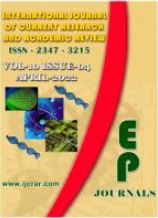Abstract Volume:10 Issue-4 Year-2022 Original Research Articles
 |
Online ISSN : 2347 - 3215 Issues : 12 per year Publisher : Excellent Publishers Email : editorijcret@gmail.com |
Soil microorganisms play an important role in soil biogeochemical processes, such as decomposition of organic material, nutrient cycling, pedogenesis and biotransformation of organic pollutants. The efficient and ability of microorganism activity depends on the different nutrient management practices. The aim of this review work is to identify how microorganisms respond for different soil nutrient management practices. Application of integrated manure composts; especially manure compost + bacterial fertilizer, consistently resulted in higher levels of soil respiration rate, cultivable microorganisms, and soil enzyme activities while N fertilizers showed no significant influence or negative results. Biochar application could affect microorganisms in the soil by changing in nutrient availability; changes alterations in plant-microbe signaling; and habitat formation and refuge from hyphal grazers. Addition of straw at different rate of application showed variation in bacterial population. Substrate quality can affect the micro-organisms community composition and structure, give positive or negative response to the addition of substrate either organic or in organic. Further characterization of long-term manure effects on multiple aspects of soil microbial communities in different agro-ecological systems is required as Ethiopian context. Additionally, further study to bring the contradicting ideas on long term application of mineral fertilizer will be needed.
How to cite this article:
Merga Tizazu Hailu and Gebeyanesh Worku Zerssa. 2022. Responses of Soil Microorganisms under Different Soil Amendment Practices.Int.J.Curr.Res.Aca.Rev. 10(4): 78-83doi: https://doi.org/10.20546/ijcrar.2022.1004.005



Quick Navigation
- Print Article
- Full Text PDF
- How to Cite this Article
- on Google
- on Google Scholor
- Citation Alert By Google Scholar
